
La Grande Bouffe is a 1973 satirical film directed by Marco Ferreri. It stars Marcello Mastroianni, Ugo Tognazzi, Michel Piccoli, Philippe Noiret and Andréa Ferréol. The film centres on a group of friends who plan to eat themselves to death. It satirises consumerism and the decadence of the bourgeoisie and was therefore controversial upon its release. It has become a cult film.

The Working Class Goes to Heaven, released in the US as Lulu the Tool, is a 1971 political drama film directed by Elio Petri. It depicts a factory worker's realisation of his own condition as a simple "tool" in the process of production and, implicitly, his struggle with the trade unions.

Ugo Tognazzi was an Italian actor, director, and screenwriter.

Tragedy of a Ridiculous Man is a 1981 Italian film directed by Bernardo Bertolucci. It stars Anouk Aimée and Ugo Tognazzi, who was awarded the Best Male Actor Award at the 1981 Cannes Film Festival for his performance. In his review, Vincent Canby describes the film as, "Bernardo Bertolucci's very good, cerebrally tantalizing new film, Tragedy of a Ridiculous Man, the story of what may or may not be a terrorist kidnapping of the sort that has been making Italian headlines with increasing frequency in recent years."
The Nastro d'Argento is a film award assigned each year, since 1946, by Sindacato Nazionale dei Giornalisti Cinematografici Italiani, the association of Italian film critics.

La terrazza is a 1980 Italian drama film directed by Ettore Scola. The all-star cast features the best of Italian Cinema of its era: Marcello Mastroianni, Ugo Tognazzi, Vittorio Gassman, Jean-Louis Trintignant, Serge Reggiani, Stefano Satta Flores, Stefania Sandrelli, Carla Gravina, Ombretta Colli, Milena Vukotic.

I Knew Her Well is a 1965 Italian comedy-drama film directed by Antonio Pietrangeli and starring Stefania Sandrelli.
The Nastro d'Argento is a film award assigned each year, since 1946, by Sindacato Nazionale dei Giornalisti Cinematografici Italiani, the association of Italian film critics.
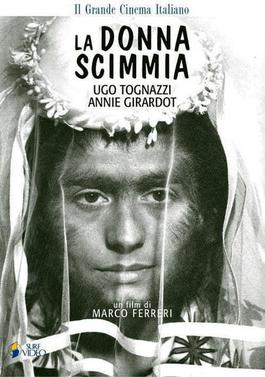
The Ape Woman is a 1964 Italian-French drama film directed by Marco Ferreri. It was entered into the 1964 Cannes Film Festival. The film was inspired by the real-life story of Julia Pastrana a 19th-century woman exploited as a freak show attraction by her manager Theodore Lent.
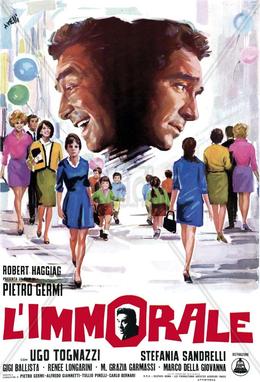
L'immorale is a 1967 Italian comedy film directed by Pietro Germi. It was entered into the 1967 Cannes Film Festival.

Traffic Jam is a 1979 Italian satirical comedy-drama film directed by Luigi Comencini. It was entered into the 1979 Cannes Film Festival. The film, although uncredited, is based on the 1966 short story "L'Autoroute du sud" by Julio Cortázar.

Alberto Bevilacqua was an Italian writer and filmmaker. Leonardo Sciascia, an Italian writer and politician, read Bevilacqua's first collection of stories, The Dust on the Grass (1955), was impressed and published it. Mario Colombi Guidotti, responsible for the literary supplement of the Journal of Parma, began to publish his stories in the early 1950s.
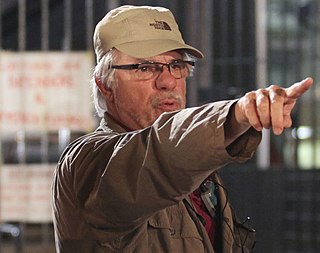
Ricky Tognazzi is an Italian actor and film director. He has appeared in 50 films and television shows since 1963. His film The Escort was entered into the 1993 Cannes Film Festival.
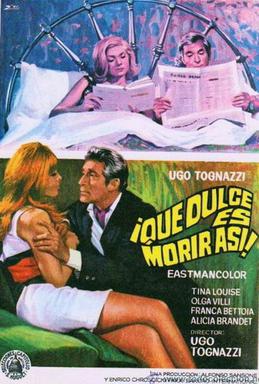
The Seventh Floor is a 1967 Italian comedy film directed by and starring Ugo Tognazzi. It is based on the short story "Sette piani" by Dino Buzzati, featured in the 1942 short story collection The Seven Messengers. The film was entered into the 17th Berlin International Film Festival.
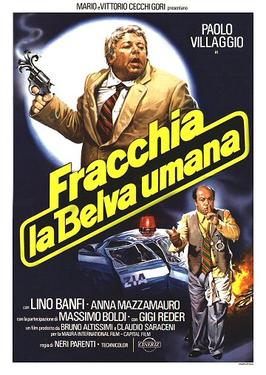
Fracchia la belva umana is a 1981 Italian comedy film directed by Neri Parenti. The film is loosely inspired by The Whole Town's Talking. It was screened at the 67th Venice International Film Festival as an Italian comedy. Its cast includes: Paolo Villaggio, Lino Banfi and the then young Massimo Boldi and Francesco Salvi.

A Joke of Destiny is a 1983 Italian comedy film directed by Lina Wertmüller. It was entered into the 14th Moscow International Film Festival.

Evil Thoughts, is a 1976 Italian comedy film written, directed and starred by Ugo Tognazzi.

Gianmarco Tognazzi is an Italian actor.

Milanese in Naples is a 1954 Italian comedy film directed by Enzo Di Gianni and starring Eva Nova, Ugo Tognazzi and Carlo Campanini. The film's sets were designed by the art director Oscar D'Amico.

















